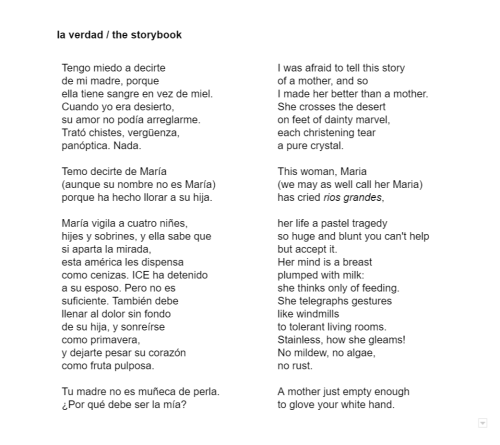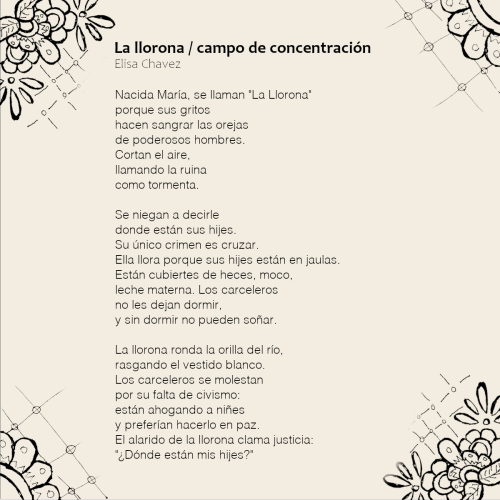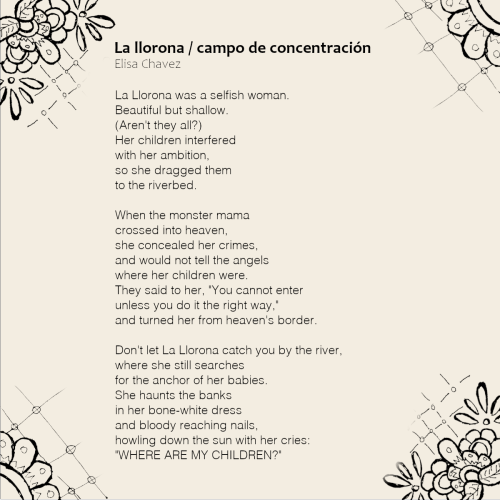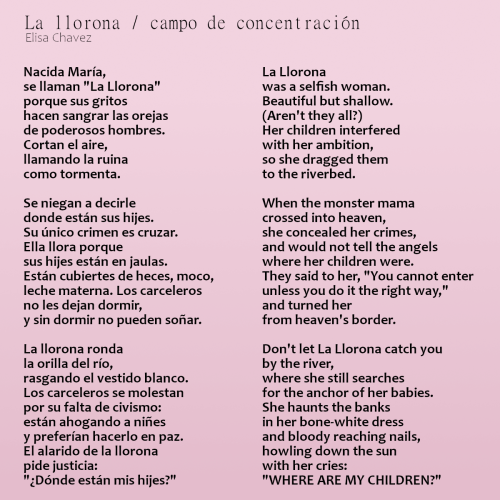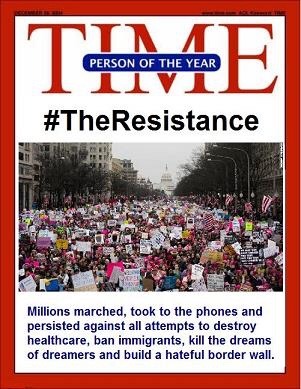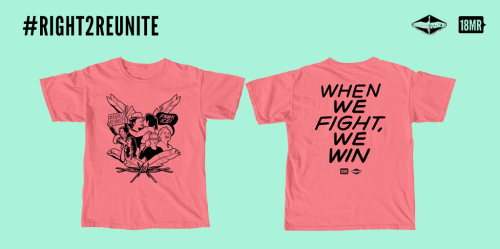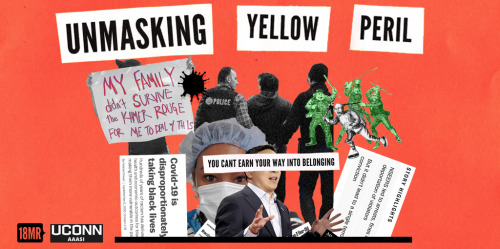#immigrant rights
la verdad / the storybook
Tengo miedo a decirte
de mi madre, porque
ella tiene sangre en vez de miel.
Cuando yo era desierto,
su amor no podía arreglarme.
Trató chistes, vergüenza,
panóptica. Nada.Temo decirte de María
(aunque su nombre no es María)
porque ha hecho llorar a su hija.María vigila a cuatro niñes,
hijes y sobrines, y ella sabe que
si aparta la mirada,
esta américa les dispensa
como cenizas. ICE ha detenido
a su esposo. Pero no es
suficiente. También debe
llenar al dolor sin fondo
de su hija, y sonreírse
como primavera,
y dejarte pesar su corazón
como fruta pulposa.Tu madre no es muñeca de perla.
¿Por qué debe ser la mía?I was afraid to tell this story
of a mother, and so
I made her better than a mother.
She crosses the desert
on feet of dainty marvel,
each christening tear
a pure crystal.This woman, Maria
(we may as well call her Maria)
has cried rios grandes,her life a pastel tragedy
so huge and blunt you can’t help
but accept it.
Her mind is a breast
plumped with milk:
she thinks only of feeding.
She telegraphs gestures
like windmills
to tolerant living rooms.
Stainless, how she gleams!
No mildew, no algae,
no rust.A mother just empty enough
to glove your white hand.-elisa chavez
For more information on the Miss Translated series, it’s on Goodreads???? Whoa! I didn’t put it there.
I am afraid to tell you
of my mother, because
she has blood instead of honey.
When I was desert,
Her love couldn’t fix me.
She tired jokes, shame,
Panóptica*. Nothing.
I’m afraid to tell you about María
(although her name is not María)
because she has made her daughter cry.
María watches over four children,
daughters and nephews, and she knows that if you look away,
this America dispenses them
like ashes. ICE has arrested
Her husband. But it isn’t
Enough. You should
Fill the endless pain
Your daughter has, and smile
Like spring,
And allow yourself to feel her heart
Like pulpy fruit.*
Your mother is not a doll of pearl.
Why should mine be?
im not fluent in spanish nor am i a translator! corrections/additions are 100% welcomed
Panóptica, im not sure what this means, i looked around and found a mexican band that does electronic music, and also a drug company.
I wasnt sure of how to translate this sentence sp if anyone has any more insights pls lmk
Blessed by another reader translation! I love these so much.
Fun fact: This poem is based on the divide between the Latine immigrant experiences represented in “American Dirt” by Jeanine Cummins and my own experiences as a Chicana whose family works on immigrant rights.
[I’m learning Spanish and still FAR from fluent, so please forgive my errors! There were a few parts I read a little differently than @misteerie did in their reader translation, so I thought I’d try translating it, too. Most of this is the same as theirs, but I put the differences in orange in case anyone else likes comparing translations lol.]
the truth
I’m scared to tell you
about my mother, because
she has blood in place of honey.
When I was adesert,*
her love couldn’t fix me.
She tried jokes, shame,
surveillance.* Nothing.I’m afraid to tell you about María
(even though her name isn’t María)
because she’s made her daughter cry.María watches over four kids,
her own and her siblings’,* and she knows that
if she looks away,
this America will scatterthem
like ashes. ICE has already taken
her husband. But it’s not
enough.She* must also fill her daughter’s
bottomless grief, and smile
likespringtime,
and leave you to weigh her heart
likefleshy fruit.Your mother is not a pearl doll.
Why should mine be?–
[*cuando era desierto: I was really indecisive over whether to translate “desierto” to a more definite emotional state, like “depressed” or “desolate,” but (and I might be totally off here, both in interpreting the language and the poetry) I interpreted the original line as a metaphor, so translating it literally to “desert” seemed truer to that.
*panóptica: this word choice really interested me and is what made me want to try actually translating this poem instead of just doing it in my head. I’m not sure, but I think it’s a loanword coming from “panopticon,” so “surveillance” seemed to fit.
*cuatro niñes, / hijes y sobrines: I wanted to preserve the gender neutral language, but I think my way just ended up kinda clunky. :/
*También debe llenar…: I went back and forth between interpreting these lines as “It (ICE) must…” or “She (María) must…”. I didn’t give a lot of consideration to “You should…” because we already have the informal “dejarte”, so I didn’t think a shift into usted was likely.]
Post link
la verdad / the storybook
Tengo miedo a decirte
de mi madre, porque
ella tiene sangre en vez de miel.
Cuando yo era desierto,
su amor no podía arreglarme.
Trató chistes, vergüenza,
panóptica. Nada.Temo decirte de María
(aunque su nombre no es María)
porque ha hecho llorar a su hija.María vigila a cuatro niñes,
hijes y sobrines, y ella sabe que
si aparta la mirada,
esta américa les dispensa
como cenizas. ICE ha detenido
a su esposo. Pero no es
suficiente. También debe
llenar al dolor sin fondo
de su hija, y sonreírse
como primavera,
y dejarte pesar su corazón
como fruta pulposa.Tu madre no es muñeca de perla.
¿Por qué debe ser la mía?I was afraid to tell this story
of a mother, and so
I made her better than a mother.
She crosses the desert
on feet of dainty marvel,
each christening tear
a pure crystal.This woman, Maria
(we may as well call her Maria)
has cried rios grandes,her life a pastel tragedy
so huge and blunt you can’t help
but accept it.
Her mind is a breast
plumped with milk:
she thinks only of feeding.
She telegraphs gestures
like windmills
to tolerant living rooms.
Stainless, how she gleams!
No mildew, no algae,
no rust.A mother just empty enough
to glove your white hand.-elisa chavez
For more information on the Miss Translated series, it’s on Goodreads???? Whoa! I didn’t put it there.
I am afraid to tell you
of my mother, because
she has blood instead of honey.
When I was desert,
Her love couldn’t fix me.
She tired jokes, shame,
Panóptica*. Nothing.
I’m afraid to tell you about María
(although her name is not María)
because she has made her daughter cry.
María watches over four children,
daughters and nephews, and she knows that if you look away,
this America dispenses them
like ashes. ICE has arrested
Her husband. But it isn’t
Enough. You should
Fill the endless pain
Your daughter has, and smile
Like spring,
And allow yourself to feel her heart
Like pulpy fruit.*
Your mother is not a doll of pearl.
Why should mine be?
im not fluent in spanish nor am i a translator! corrections/additions are 100% welcomed
Panóptica, im not sure what this means, i looked around and found a mexican band that does electronic music, and also a drug company.
I wasnt sure of how to translate this sentence sp if anyone has any more insights pls lmk
Blessed by another reader translation! I love these so much.
Fun fact: This poem is based on the divide between the Latine immigrant experiences represented in “American Dirt” by Jeanine Cummins and my own experiences as a Chicana whose family works on immigrant rights.
Post link
La llorona / campo de concentración
Elisa Chavez
Nacida María, se llaman “La Llorona"
porque sus gritos
hacen sangrar las orejas
de poderosos hombres.
Cortan el aire,
llamando la ruina
como tormenta.Se niegan a decirle
dónde están sus hijes.
Su único crimen es cruzar.
Ella llora porque
sus hijes están en jaulas.
Están cubiertes de heces, moco,
leche materna. Los carceleros
no les dejan dormir,
y sin dormir no pueden soñar.La llorona ronda la orilla del río,
rasgando el vestido blanco.
Los carceleros se molestan
por su falta de civismo:
están ahogando a niñes
y preferían hacerlo en paz.
El alarido de la llorona clama justicia:
“¿Dónde están mis hijes?”La Llorona was a selfish woman.
Beautiful but shallow.
(Aren’t they all?)
Her children interfered
with her ambition,
so she dragged them
to the riverbed.When the monster mama
crossed into heaven,
she concealed her crimes,
and would not tell the angels
where her children were.
They said to her, “You cannot enter
unless you do it the right way,”
and turned her from heaven’s border.Don’t let La Llorona catch you by the river,
where she still searches
for the anchor of her babies.
She haunts the banks
in her bone-white dress
and bloody reaching nails,
howling down the sun with her cries:
“WHERE ARE MY CHILDREN?”
(Alternative design/format here.)
Born María, they are called “La Llorona”*
because her screams
Make the ears of
powerful men bleed.
They cut through the air,
calling the ruin
a thunderstorm.*
They refuse to tell her
Where her children are.
Her only crime is crossing.
She cries because
her children are in cages.
They are covered with scum*, snot,
breast milk. The jailer
doesn’t let them sleep,
and without sleep they can not dream.
La Llorona runs along the river bank,
tearing the white dress.
The jailers are bothered
by her lack of civility:
They are drowning children
and preferred to do so in peace.
The shrieks of La Llorona cry out for justice:
“¿Dónde están mis hijes?”*
spanish translation into english (I am not fluent in spanish nor am i a translator)
* I didn’t translate La LLorona because I thought that the author was using it as a title for the woman this poem is about. It’s a reference to a Latine American folktale and translates directly as the weeping woman.
*this sentence gave me some difficulty so if anyone has alternate ideas on how to translate it please lmk
*this word heces couldve been translated as feces but that seemed to formal imo & i liked the alliteration*didnt translate the last line bc imo the woman in this poem is Latine and would be speaking spanish, translated it means “Where are my children?”
Post link
La llorona / campo de concentración
Elisa Chavez
Nacida María,
se llaman “La Llorona"
porque sus gritos
hacen sangrar las orejas
de poderosos hombres.
Cortan el aire,
llamando la ruina
como tormenta.
Se niegan a decirle
dónde están sus hijes.
Su único crimen es cruzar.
Ella llora porque
sus hijes están en jaulas.
Están cubiertes de heces, moco,
leche materna. Los carceleros
no les dejan dormir,
y sin dormir no pueden soñar.
La llorona ronda
la orilla del río,
rasgando el vestido blanco.
Los carceleros se molestan
por su falta de civismo:
están ahogando a niñes
y preferían hacerlo en paz.
El alarido de la llorona
clama justicia:
"¿Dónde están mis hijes?”
La Llorona
was a selfish woman.
Beautiful but shallow.
(Aren’t they all?)
Her children interfered
with her ambition,
so she dragged them
to the riverbed.
When the monster mama
crossed into heaven,
she concealed her crimes,
and would not tell the angels
where her children were.
They said to her, “You cannot enter
unless you do it the right way,"
and turned her
from heaven’s border.
Don’t let La Llorona catch you
by the river,
where she still searches
for the anchor of her babies.
She haunts the banks
in her bone-white dress
and bloody reaching nails,
howling down the sun
with her cries:
"WHERE ARE MY CHILDREN?”
Good morning everybody! This is an old-new poem, first published last year in Miss Translated: A Benefit for the New Sanctuary Coalition. Today I present it to you featuring hopefully-more-legible-typeface! colors??? and, as ever, a grammar mistake I noticed at the very last minute. Don’t forget to abolish ICE! Besos a todes.
Post link
A guest blog by Melissa García, Associate Director of the Raíz program. Raíz is a program by Planned Parenthood Federation of America that works alongside the Latinx community to fight for reproductive health, sex education, and access to care. Raíz organizers work with Planned Parenthood affiliates and community partners across the country to train leaders and speak out about issues affecting local Latinx communities.

If you talk to our Raiz staff, you’ll hear the real stories of our community and patients: An undocumented woman not knowing where she could go to get her yearly exam but being asked for a social security number. Another patient seeking birth control but being questioned about her immigration status.
At Planned Parenthood, we believe that health has no borders, and that the ability to live and thrive without fear and to access health care are basic human rights.
Planned Parenthood of Greater Washington and North Idaho (PPGWNI) is proud to provide high-quality care to everyone regardless of country of origin, documentation, and refugee status.
However, what’s troublesome is that the state of Washington is now seeing increased activity of Customs Border Patrol (CBP) and Immigration Customs Enforcement (ICE) at an alarming rate — a trend that’s happening across the country.
For example, August 8, 2018 marked a turning point when CBP detained an immigrant, Juan Bonilla, who was travelling after they asked about his citizenship status while conducting a warrantless search at a bus stop in Spokane. With more and more arrests by CBP in recent months and the tripling of ICE arrests of people without criminal convictions in the Spokane area, the Raiz team in Spokane began convening with community groups to say:
Enough. The community, including Planned Parenthood patients, deserve to feel safe, and travel freely without interrogation and harassment.

They began working with the American Civil Liberties Union and a local coalition group called “No Discrimination Spokane” to put a stop to CBP’s and ICE’s actions. One goal of the proposed ordinance was to get the Spokane City Council to prevent ICE and CBP from accessing non public spaces of city-owned without a federal judicial warrant, for purposes of employee and resident safety. Simply put, this ordinance puts Spokane and its people first.
They moved quickly to engage the Spokane City Council and amplified the stories of people and families impacted by ICE and CBP arrests. All in all, they helped turn out more than 300 community members for a city council meeting where a policy to protect residents and employees and deter ICE and CBP arrests would be voted on. They showed up in full force ranging from faith leaders to Indigenous representatives, while only three people spoke in opposition.
Their organizing worked. The policy passed, 6-1, which made it veto proof and effective immediately. The community won. It’s important to note that the key to our success was making sure PPGWNI staff, patients and families are living in a safe and welcome community.
However, as Spokane’s Mayor continues to defy the ordinance, PPGWNI and the coalition continue to ensure this policy is enforced to put an end to CBP’s and ICE’s violation of their rights. It’s simple: We all deserve to feel safe and travel in our communities without fear of interrogation or harassment.
Migrant women workers in Canada continue to face barriers to abortion access: advocates - National | Globalnews.ca
Migrant women in Canada face profound barriers in accessing health care, especially when it comes to pregnancy. They often hide their pregnancies because if employers find out, they may send them home or refuse to hire them next season. Workers typically live on their employer’s property and lack the privacy to discreetly seek care. Many live in remote, rural areas where abortion access is already sparse and transportation is hard to come by. And they face the added challenge of being unable to receive health care in their first language.
Another major barrier is cost, said Elene Lam, executive director of Butterfly, an organization of sex workers, social, legal and health professionals that advocates for the rights of Asian and migrant sex workers.
The migrant workers Lam advocates for typically lack provincial health-care coverage, and are required to pay out of pocket, she said. Depending on the stage of pregnancy, that can cost anywhere between a few hundred dollars and up to $1,500.
While many migrant workers can access public health care, not all of them can, said Lindsay Larios, assistant professor at the University of Manitoba, who studies precarious migration and reproductive justice.
ICE Raid Resources
Compiled by Becky Butler / Available on gDocs
Hotlines/Apps
- United We Dream MigraWatch Hotline1-844-363-1423
- United We Dream Notifica App
- HoustonImmigrants’ Rights Hotline1-833-HOU-IMMI
- ACLU of Texas MigraCam
Know Your Rights Resources
- Informed Immigrant: Know Your Rights
- Immigrant Defense Project Know Your Rights FlyersinEnglishorSpanish
- United We Dream Know Your Power, Know Your Rights
- American Immigration Lawyers Association Know Your Rights HandoutsinEnglishorSpanish
- National Immigrant Justice Center Know Your Rights Graphics on preparing for ICE raids
- CLINIC:Know Your RightsinAmharic,Arabic,Chinese,Farsi,Haitian Creole,Korean, and Vietnamese
- American Federation of TeachersKnow Your Rights for Families and Students
Rights During Raids
- Immigrant Legal Resource Center Red Cards
- ACLUWhat to Do If Immigration Agents (ICE) Are at Your Door&Video in English and Spanish
- ACLUWhat to Do When Interacting with ICE- Videos in 7 languages
- American Federation of Teachers Do’s and Don’ts for students if ICE authorities come to their homes
- National Immigration Law Center Rights at Home&Know Your Rights
- SEIUKnow Your Rights
Family Preparedness Plans:
- Informed Immigrant Emergency Plan for Detained or Deported Family Members
- SEIURaids Response Checklist
- CLINIC:Emergency Planning Guide
- Michigan Immigrant Rights Center Preparing Your Family GuideinEnglishandSpanish & Family Preparedness for Immigration Enforcement Video in English or in Spanish
Parental and Family Rights Toolkits:
- Women’s Refugee Commission Parental Rights Toolkit for detained and deported immigrants
- Freedom for Immigrants Information for Families of Detained Immigrants
General Guides
- Informed Immigrant Guide on how to prepare for an immigration raid
- American Immigration Lawyers Association: Resources for Responding to Raids
- Immigrant Legal Resource Center Compilation of Resources on Raids
- National Immigration Law Center Toolkit for Organizations Responding to Mass Immigration Raids
Community Resources
- National Immigration Law Center How to Be Prepared for an Immigration Raid
- Fair Immigration Reform Movement Community Raid Preparedness Checklist
- National Immigrant Justice Center Community Resources
- National Immigration Project Pre-Raid Community Safety Plan&Community Resources on Raids
- CLINIC:Rapid Response Toolkit for Advocates and Communities
- The Episcopal Church Resources for Communities During ICE Raids
- LA RED: Deportation Defense Guide for the Faith Community
- Rapid Response Toolkit for Faith Allies (shared by Church World Service)
Rights in Detention:
- National Immigrant Justice Center Rights in DetentioninEnglishorSpanish
- ICE Detainee Locator
Legal Providers
- Informed Immigrant Legal Service Locator
- UnidosUS’sImmLocaltool
Compiled by Becky Butler / Available on gDocs, 2019.06
Post link
We’re super excited to share our new shirts with you, created in partnership with Asian Prisoner Support Committee!
We need your support to reunite four Cambodian deportees with their families and community. If we’re able to stop people from getting deported, we can also bring them back home!
Kay Kay, China, Tone, and Chantha came to the US as refugee children fleeing from the US-backed genocide in Cambodia, the Khmer Rouge. Now, ICE has ripped apart their families because their status as formerly-incarcerated refugees made them targets for deportation.
Kay Kay, China, Tone and Chantha’s families were resettled by the US government in heavily-policed and under-resourced neighborhoods in California. As youths in the 1990s, they committed crimes during an era of “tough on crime” laws that drove mass incarceration to new heights.
Kay Kay, China, Tone and Chantha rebuilt their lives after being released. Now they are struggling to survive after being deported to Cambodia, a country they do not know. 80% of all deportation orders for Southeast Asian Americans are based on old criminal records that have already been served.
These Cambodian refugees escaped one of the worst genocides of the 20th century to seek safety in the US, only to be deported and separated from their families.
Get a shirt to help reunite Kay Kay, China, Tone and Chantha’s families!

Our shirt design is by Raychelle Duazo, a queer femme Filipina-American illustrator and tattoo artist from the Pacific Northwest. See more of Raychelle’s work @bombchelle.
Post link
Not only do Asian Americans worry about surviving the virus, we also fear for our lives. Our loved ones are experiencing skyrocketing levels of unchecked hate and violence – over 100 hundred hate crimes a day. This violence is the latest iteration of Yellow Peril. It is a form of white supremacist settler nationalism that the U.S. pioneered to peddle racial fear and justify endless global war and the exploitation and expulsion of what they perceive as diseased and enemy Asians.
What we are experiencing in 2020 is tied to the violence of the mid-1800s when Chinese immigrants were targeted while risking their lives to lay railroad tracks. As a result of white suspicion and fear, the US passed racial bans on immigration and naturalization in the Chinese Exclusion Act of 1882. This law created a new gold standard in settler states and made Yellow Peril a core element of US national identity.
The onset of the COVID-19 pandemic fit the ready-made story of Yellow Peril in the US. Racist responses to the spread of the disease are consistent with a history of treating Asians as a foreign threat. Part of undoing the power of Yellow Peril is confronting the history of empire, capitalism, and white supremacy and building a vision of peace, justice, and health which celebrates and honors our interdependence.

Unmasking Yellow Peril is a collaboration between 18 Million Rising, the Asian and Asian American Studies Institute at UConn, and Jason Oliver Chang, Associate Professor of History and Asian American Studies at UConn. We seek to ground ourselves in the long history of Yellow Peril, uncover its many forms, and resist it in the time of COVID-19.
Yellow Peril has been here for more than a century, it’s time to unmask it.
Learn more about the history of Yellow Peril and download our free Unmasking Yellow Peril zine!
Post link
You’re invited to ANTIDOTES 4 YELLOW PERIL! From Filipino nurses on the COVID-19 frontlines, to Chinatown businesses closing due to xenophobia, Asian Americans are challenged to heal and be the freedom fighters our communities need right now. That’s why we’re teaming up with Spenta Kandawalla of Jaadu Acupuncture and co-founder of generative somatics to bring you a virtual healing practice space, in the time of pandemic and Yellow Peril.
The event, on April 25 at 1 pm ET, is FREE with sliding scale donations and open to all. Register here.
Participants will be guided through somatic practices and learn how Traditional Chinese Medicine can build our resilience and immunity.
Accessibility:
✿ We will have ASL interpretation for the event.
✿ The practitioner will share adaptations to each somatic practice to meet participants’ diverse physical needs.
✿ Participants who register will have unlimited replay access to the event, even if they do not attend it live.
✿ Unfortunately, we are unable to provide live closed captioning.
Post link

